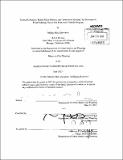Tactical urbanism, public policy reform, and 'innovation spotting' by government : from Park(ing) Day to San Francisco's parklet program
Author(s)
Davidson, Mariko Mura
DownloadFull printable version (9.701Mb)
Alternative title
Tactical urbanism, public policy reform, + 'innovation spotting' by government : from PARK(ing) Day to San Francisco's parklet
Other Contributors
Massachusetts Institute of Technology. Department of Urban Studies and Planning.
Advisor
Xavier de Souza Briggs.
Terms of use
Metadata
Show full item recordAbstract
This thesis examines the prospects and impacts of tactical urbanism (TU). While tactical urbanism remains primarily a subcultural movement, it is beginning to gain traction in popular culture in traditionally politically liberal cities, and in some cases, with their respective city governments. However, little data and formal research exists on TU. I employ a comparative case study approach. This thesis examines the urban legend surrounding San Francisco's parklet program, as many assume it a result of the TU intervention, PARK(ing) Day. By looking at the process of formalization of the parklet program, the thesis seeks to uncover creative methods of policy reform, for example through "innovation spotting" by local government. I also examine three other TU projects in Dallas, Texas; Brooklyn, New York; and Raleigh, North Carolina. I argue that tactical urbanism is a play on the physical and political landscape, manifested as a design intervention. While interventions play on the two landscapes-not one-urban tacticians tend to focus primarily on the physical play and miss the opportunities presented by playing off the political and institutional bodies as well. Tacticians that relate their projects to interest groups and government have a better chance to formalize their intervention. Interventions capture these efforts with varying levels of success and sophistication, with each project different in context and texture. TU poses a host of risks and potential rewards. Like traditional acts of civil disobedience, TU can be very generative, allowing players to pilot projects on a small-scale, minimizing risk and cost. TU can go beyond spotlighting problems to produce solutions. Both are good, I argue, for government and good for would-be innovators in civil society. Yet with rule breaking comes the risk of going beyond civil disobedience and duty into parochial, special-interest agendas and even vigilantism. To minimize that risk, the field needs some rules of the road, as safeguards in the TU playbook. As of now, TU does not have a code. Developing one is a critical next step, both for urban tacticians and planning research.
Description
Thesis (M.C.P.)--Massachusetts Institute of Technology, Dept. of Urban Studies and Planning, 2013. Cataloged from PDF version of thesis. Vita. Includes bibliographical references (p. 58-63).
Date issued
2013Department
Massachusetts Institute of Technology. Department of Urban Studies and PlanningPublisher
Massachusetts Institute of Technology
Keywords
Urban Studies and Planning.